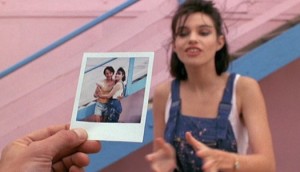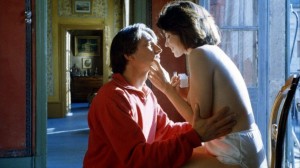 At its heart Betty Blue is an intense, unforgiving drama, which quickly unfolds to a devastating and emotional end. Whilst both the main characters, Betty (played by Béatrice Dalle) and Zorg (Jean-Hugues Anglade) spend a great deal of the film naked (not that anyone is complaining), the viewer quickly stops noticing this surface nudity and realises that it represents something so much more, something much deeper beneath the surface. These layers are what director, Jean-Jacques Beineix, aims to dissect throughout until his characters come crashing down at the end.
At its heart Betty Blue is an intense, unforgiving drama, which quickly unfolds to a devastating and emotional end. Whilst both the main characters, Betty (played by Béatrice Dalle) and Zorg (Jean-Hugues Anglade) spend a great deal of the film naked (not that anyone is complaining), the viewer quickly stops noticing this surface nudity and realises that it represents something so much more, something much deeper beneath the surface. These layers are what director, Jean-Jacques Beineix, aims to dissect throughout until his characters come crashing down at the end.
The story opens with a beautifully delicate sex scene between the two; from the very start of the film the audience are made to understand that they will be burrowing deep with these characters and growing intimate with them very quickly. The camera is slow moving and doesn’t interfere with their love making but instead watches, not in a voyeuristic way, but a calm and acknowledging way completely filling up the shot. Then Zorg’s narration explains he and Betty met a week ago and they have had a lot of sex. Historically, Betty Blue, was remembered as an erotically charged drama and for the most part, the relationship between Zorg and Betty does seem based on their sexual chemistry but there really is so much more in this film to discuss.
When Betty moves in with Zorg after she quits her job, she is tricked by Zorg’s landlord into helping paint all the bungalows in the area – she doesn’t react well to this and for the first time in the film the audience are witness to her terrible anger episodes, which reoccur throughout the film and become more and more violent. When she stumbles across some writings of Zorg’s, she becomes engrossed in reading in its entirety, his works, and believes it should be read by others. As her love for Zorg grows, she realises that he is not appreciated here and should be doing something better with his life. Like the passion in their relationship, she sets fire to their home and persuades him to run away with her.
Here really begins the tale and it is like any other romantic epic (but is so very, very French); girl meets boy, boy gets turned on, girl and boy live together, girl thinks she is pregnant (later to find out she is not) and then removes her own eye and finally boy suffocates girl whilst dressed as a girl… (take a breath!)
thinks she is pregnant (later to find out she is not) and then removes her own eye and finally boy suffocates girl whilst dressed as a girl… (take a breath!)
Of course there is much more to Betty Blue than simply this storyline; the film is beautifully shot, really taking care to illicit intense and important emotions in the audience and ready to rouse them at the next part of the tale. The locations of the film are so carefully teased out and the camera lulls in the lavish colours of the surroundings; whether it is the small villages, the houses they live in or the fields they wander. On top of that, the performances from both Dalle and Anglade remain just as believable and powerful today as they did in 1986. Their chemistry is explosive; their sex scenes are erotic, indulgent and add another level of fascination to the film – without them, the audience wouldn’t have a true understanding of how close the couple were. Both of them move their bodies in the most interesting of ways, seducing each other and the audience – both whilst naked and clothed.
 The second half of the film suddenly really touches on the emotions of the characters and the audience are realise this is one of the most important love stories of all; whilst almost dream like, at points the fantasy is broken when Betty’s anger and illnesses rear their head. Whilst she becomes obsessed with trying to get Zorg’s book published, he becomes worried when he starts to get rejections and can’t write anything else – he doesn’t want to upset this volatile woman but when she reveals she is pregnant, the couple become ecstatic with happiness.
The second half of the film suddenly really touches on the emotions of the characters and the audience are realise this is one of the most important love stories of all; whilst almost dream like, at points the fantasy is broken when Betty’s anger and illnesses rear their head. Whilst she becomes obsessed with trying to get Zorg’s book published, he becomes worried when he starts to get rejections and can’t write anything else – he doesn’t want to upset this volatile woman but when she reveals she is pregnant, the couple become ecstatic with happiness.
The last moments of the film are heartbreaking; when it turns out Betty isn’t pregnant, she starts to lose her mind and falls into a state of shock when she removes one of her eyes. Dressed up as a woman (looking like something from a Brian De Palma film), Zorg suffocates Betty out of pity before returning home and finally being able to write his next book… Ironic?
This bittersweet ending is a reminder that nothing remains forever and that relationships such as this are so delicate. Betty Blue is a small masterpiece of filmmaking, revelling in everything on screen. It has since become a cult classic and rightly so.




